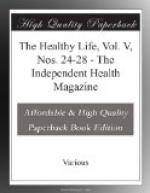his care in the last twelve months, and the three
above mentioned were none of them under his care
at the time of their danger.
What, then, must be our conclusions in reference
to these and similar
facts of which it is only possible to give a
mere outline here? I
suggest that they are:—
1. Food quantities are of extreme importance.
2. These quantities were settled by physiologists
many years ago, and
no good reasons have since been adduced for
altering them.
3. The required quantity is approximately
nine or ten grains of
proteid per day for each pound of bone and muscle
in the body weight.
4. Any considerable departure from this
quantity continued over months
and years leads to disaster.
5. The nature of this disaster may appear
to be very various and its
real cause is thus frequently overlooked.
I will say a few words about each of these except the first, which is already obvious. The layman above mentioned asserted that he could live on but little more than half this quantity, but the food quantity really required is that which will keep up normal strength, normal circulation, normal colour, normal temperature and normal mental power. As we have got perfectly definite standards of all these normal conditions, serious danger can only be run into by neglecting to measure them.
It is also possible to tell fairly accurately the quantity of food a man is taking in a day, and then, by collecting and estimating his excreta, the quantity also out of this food which he is utilising completely and burning up in his body.
You would say that no danger should be possible with all these safeguards, and yet the above case history shows that of two trained physiologists, members of the medical profession, one died at least twenty years before his time, and the other was in great danger and only recovered slowly and with difficulty. Another similar case came to the writer suffering from increasing debility and what appeared to be some form of dyspepsia. He was quite unable to pass any of the above-named tests as to physiological standards, and an investigation of his excreta showed that his food was at least one-fifth or one-sixth below its proper quantity and had probably been so for many months past. Some of his doctors had been giving his “disease” a more or less long list of names and yet had not noted the one essential fact of chronic defective nutrition and its cause—underfeeding. Naturally their treatment was of no avail, but when he had been sent to a nursing home and had put back the 20 lbs. of weight he had lost he came slowly back to more normal standards and is now out of danger. In this case there was marked loss of weight, and few people, one would think, would overlook such a sign of under nutrition. But loss of weight is not always present in these cases, at least not




